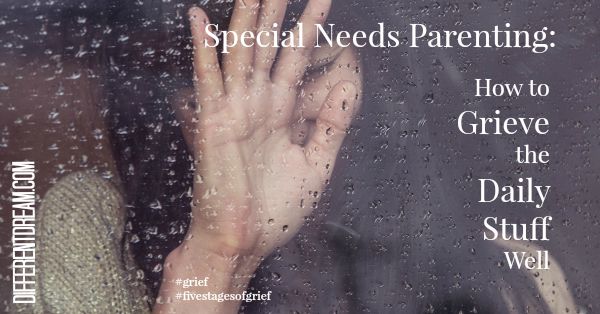How to Cope with Special Needs Grief

Today’s post by guest blogger Laurie Wallin addresses an issue parents of kids with special needs face every single day. Grieving the family life they will never have. And she gives some practical advice about how to deal with special needs grief. Read on!
How to Cope with Special Needs Grief
Recently I left my life of raising special needs kids for 3 days of complete relaxation. I visited my mom in Arizona and enjoyed meals out, sleeping in, and lots of shopping (sans racing from the premises with tantruming 8-year old). It was a delight.
But of course all things must end. Including the good stuff. Coming back from a time away from my older two girls, whose adoption-inspired attachment struggles still rage, is not an easy thing.
As I walked from the airplane arrival gate to the baggage claim, the stress I’d left behind on my trip caught up with me. And I realized that I needed to do a little intentional grieving before I went home to my “normal” life. Not because I’d had a major loss, but because as a parent of special needs kids, I know that managing the small losses and changes makes me a healthier mom for them.
How to Grieve the Daily Stuff Well
Grief has stages, and they don’t flow linearly. We bounce all over the place, staying in one for a time, then moving through others… then back again. The following is an excerpt from a post I did on grief on my blog last year. Considering grief comes up for us all periodically, here’s what everyday grief might look like:
“This is NOT happening!” (aka Denial): It’s okay to ignore it for a little while. It’s just too heavy to deal with special needs grief every day. Sometimes I freak out about finances, and I earn bank fees for neglecting to pay bills on time. Or binge on Grey’s Anatomy for 3 hours after intense mood or behavior days with my older girls. But I give trusted people veto power over my head-in-the-sand moments, so they don’t add more stress.
“What did I do to deserve this?! This sucks!” (aka Anger): Loss creates raw rage at times. The patched holes in my bedroom walls attest to that. I did, eventually, get tired of patching holes, so I joined a gym. Now I punch a big bag, run like crazy on the treadmill, and lift weights until I can barely move. I also write through my anger—with big, dark, ugly words—so my feelings can air out, and my relationships can survive. (And I bought giant Incredible Hulk padded fists to punch the walls, in case I still need that some days…)
“Maybe if I volunteer at my kids’ school 20 hours a week, my life will _______.” (aka Bargaining): We need to feel some sense of control and normalcy in the midst of our grief. So we try to make deals with the universe and God. Some bargains are helpful (“If I sign up to take one meal to a family in crisis, I will feel like a capable person again.”) Some aren’t (“If I tirelessly, perfectly implement all therapies the doctor recommended, my child will become normal.”) When I choose the meal, I have dignity again. When I choose perfectionism, I head straight back to anger…
“Yes, I’m still in my pajamas… from yesterday.” “Please pass the death-by-chocolate ice cream.” (aka Depression): I’ve been struggling with this one for the past month, thus the intense posts. Depression is the part we imagine when we think of grief—the sadness, hopelessness, or helplessness that feels like it will overtake us. In those moments, I am extra kind to myself. I cut out multi-tasking (because it’s going to self-destruct anyway). I drink more water. Go for walks. Take a nap when I can. Pet my dog. Take a day off from life to watch movies and snuggle, which the kids know as PJ day. When we let our bodies have down time, and there isn’t any underlying medical condition, we become quieter. Which moves us toward…
“You’re a spaz, but you’re my spaz, and I wouldn’t have it any other way.” (aka Acceptance): Here’s where the healing feels real. Is life still frustrating? Yes. Nearly impossible half the time? Yes. But I’m still smiling now. And I can love my kids through their 3-hour meltdowns, ignore my dirty dishes, forgive the check-out lady for her naive comment on my parenting, and basically feel good about myself through it all. It’s where I write a letter to the kid I dreamed of, complaining about the one I actually got… and end up crumpling it up and tossing it. Because I realize I’m in love with my real-life wierdo.
What things do you find helpful in seasons of special needs grief? I’d love to hear your ideas.
Leave a Comment
Please leave a comment about how you handle your every-day special needs grief.
Do you like what you see at DifferentDream.com? You can receive more great content by subscribing to the quarterly Different Dream newsletter and signing up for the daily RSS feed delivered to your email inbox. You can sign up for the first in the pop-up box and the second at the bottom of this page.
By Laurie Wallin
Laurie is the mom of four daughters–two adopted with developmental delays, mood disorders, and ADHD. A former junior high teacher turned speaker and life coach, she loves to learn, laugh until their sides hurt, and help women be courageous in life.
14 Comments
Submit a Comment
Subscribe for Updates from Jolene
Related Posts
The Lessons I Learned while Raising a Child with EA/TEF
Jolene Philo reflects on a lifetime of lessons learned while raising a child with EA/TEF and shares the insights she’s won.
Looking Back at Your Child’s EA/TEF Journey
Looking back at your child’s EA/TEF journey can give parents a new perspective about past events. Guest blogger Maggi Gale shares how her look back clearly showed her how God was with their family during their daughter’s very unusual first weeks of life in 2002. Three...
How Do I Let Go of My Adult EA/TEF Child?
Valeria Conshafter explores the question “How do I let go of my adult EA/TEF child?” for EA/TEF Awareness Month.






You are doing so much for your son. Me saying that probably won’t take away the guilt you feel and may not ease your worry either. Those are things God alone can do. But I can do a couple things. First, do you have a special needs trust in place for your son? If not that is something you can do so he is cared for if something does happen to you. You will want to find a special needs lawyer in the state where you live to assist with that. This website offers information about special needs trust planning and can help you locate a lawyer: https://www.specialneedsalliance.org/. Second, I can pray for you. Please use the contact button in the top right hand corner to email me with specific prayer requests. Jolene
My son has autism…he is 40 now. He lives in assisted living and I try to visit him daily. The guilt that is always there. When I am home, I worry about him. Always asking am I doing enough to care for him. Even when I try to do my best by him. it is never enough. 37 years of this. Now i am 67, worry about if something happens to me, what then? I love him with all my heart.
Hi Bethany, I’m glad the post helped you. May you grieve well and rejoice well, too! Jolene
I dont cope well with my cycling grief. This post helps me see that I can overcome the grief in positive ways. Thank you for writing/sharing this post.
You’re welcome, Mel. I’m glad the post was a blessing to you.
Reading this made me realize that everything im going through is normal (define normal). Raising my kid with autism is one hell of a roller coaster ride. One day you are accepting then the next day you are grieving. But at the end of the day we just pray and stop questioning God what have we done to deserve this and just ask for His help. Thank you so much for sharing this post.
Thank you for this. I can relate. I appreciate this post so much.
You are so right, Lisa. Though we wish for more people who truly understand, we also pray they are spared this particular grief. Jolene
No one really understands when you say you have grief; they say things like “well you have your son/daughter”; they don’t understand that we don’t grieve because of what we have but rather of what our son/daughter will never experience because of his/her disabilities.
Oh, I can so relate! It is comforting to read about others who struggle with similar issues.. going back to that need to know that we are not alone! Thanks for sharing!
I’m glad you found them helpful, Shasta. Laurie’s great, isn’t she?
Jolene
Thanks for this. I’m definitely going to use some of these tips!!
http://www.outrageousfortune.net
Opal,
I’m so glad Laurie’s post comforted you. As parents of kids with special needs we rarely recognize the source of our sadness which is grief. Even if we do recognize it, we then feel guilty for grieving when our child is alive. But grief over a loss, even the loss of the childhood we hoped our kids would have, is allowed.
Jolene
This post made me cry – I realized that my recent depression is really grief. As my son gets older, it’s much harder to feel like I’m doing a good job. When he first got out of the hospital success was not having to call 911 for more than 30 days. Medically he’s more stable, but behaviorally is sometimes out of control. It’s really anxiety/PTSD from extensive hospitalization and invasive medical procedures, and sometimes there is nothing I can do but wait out a 3 hour tantrum. I feel better just being able to label my reaction as grief. Thanks.